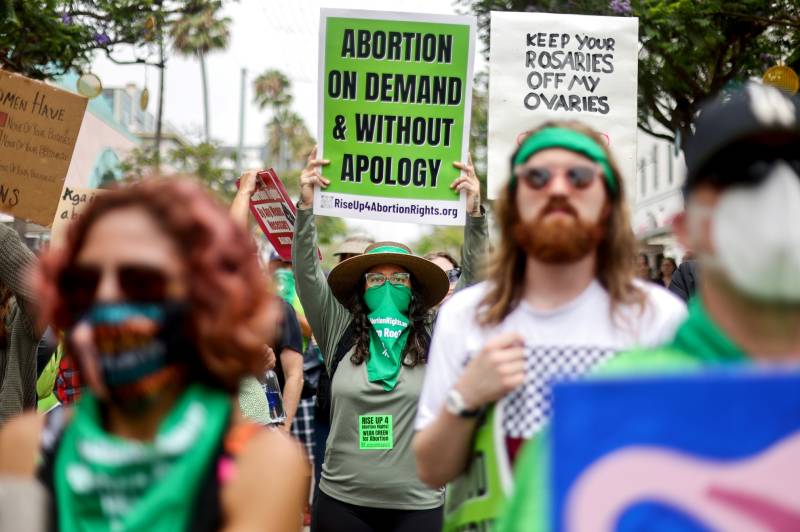“It is certainly by design that we are leading in this effort and backing up our values,” Hicks said.
Without the council’s work throughout the legislative session, lawmakers would not have been able to respond so quickly to the Supreme Court’s ruling, Hicks said. Many of the bills included amendments reacting to bans and restrictions announced in other states.
“My entire generation has lived with Roe v. Wade being the law of the land, so it’s not like we had a map on how to navigate a system without those protections,” Hicks said.
“It really took everyone coming together to design this collection of bills to become a reproductive freedom state and beacon of hope.”
This week, an Arizona judge reinstated a near-total abortion ban dating to 1864, and Southern California abortion clinics are already preparing for an influx of patients.
Newsom vetoed one bill in the package last week, citing “lower-than-expected revenues” and the need for fiscal responsibility. That bill would have required the state to fund reproductive health pilot programs in five counties.
Although fiercely opposed by a minority of religious groups and conservatives, the measures sailed through the Democratic supermajorities in both houses of the Legislature.
Voters will decide in November whether to add a state constitutional amendment protecting the right to obtain an abortion.
Newsom has made abortion a central part of his reelection campaign, drawing on California’s reputation as a reproductive health “safe haven” in his frequent attacks on other states’ politics. Likewise, many Democrats battling for a seat have hopped on abortion as the defining issue of the upcoming state and midterm elections. In June, Newsom approved a budget investing more than $200 million in reproductive health services. He also spent $100,000 in campaign money on billboards in conservative states promoting California as an abortion sanctuary.
The most contentious pieces of legislation were Assembly Bill 2223, by Democratic Assemblymember Buffy Wicks of Oakland, and Senate Bill 1142, by Democratic senators Anna Caballero of Merced and Nancy Skinner of Berkeley.
Wicks’ measure abolishes the requirement that coroners investigate stillbirths and prohibits the prosecution of anyone who ends their pregnancy even if the abortion is self-induced or happens outside of the medical system. Protesters outside the Capitol and conservative lawmakers claimed the legislation would legalize infanticide, which Wicks has characterized as “disinformation.”
In a statement following the measure’s signing, Wicks said Californians will no longer have to fear having their “pregnancy policed by state systems.”
Caballero and Skinner’s measure introduced the $20 million Abortion Practical Support Fund to help pregnant people pay for travel, lodging and other expenses that advocates say create access barriers. Although the money was secured in the state budget, Newsom restricted its use to California residents, a move abortion-rights advocates rallied hard to overturn in the final days of the legislative session. Last-minute amendments to the health omnibus budget bill allow out-of-state patients to receive grants from the fund.
Caballero and Skinner’s measure also required the state to create an abortion information website detailing state laws and resources, which Newsom launched two weeks ahead of the bill’s signing.
The website has had immediate impact, Hicks said, adding that colleagues in other states have shared how difficult it is for people seeking an abortion to find information.
“The website, I tear up every time I look through it. For a patient that doesn’t know where to go or what to do, the impact is immediate and huge,” Hicks said.
Other measures in the package allow nurse practitioners to perform some abortion procedures without the supervision of a doctor; provide loans and scholarships for clinicians-in-training who commit to providing reproductive health care in underserved areas; and prohibit law enforcement, medical providers and California-based tech companies from cooperating with law enforcement in states where abortion is criminalized.
Senate President Pro Tem Toni Atkins said in a statement that the package will ensure that anyone who comes to California will “receive the essential health care they need.”
“My colleagues and I saw the imminent danger headed for national abortion access more than a year ago and have spent every day since working to not only protect reproductive rights, but expand them,” Atkins said.
Although California does not collect comprehensive abortion data, an estimated 154,000 abortions were performed in 2020, according to the Guttmacher Institute, a national reproductive rights think tank that periodically surveys abortion providers.

